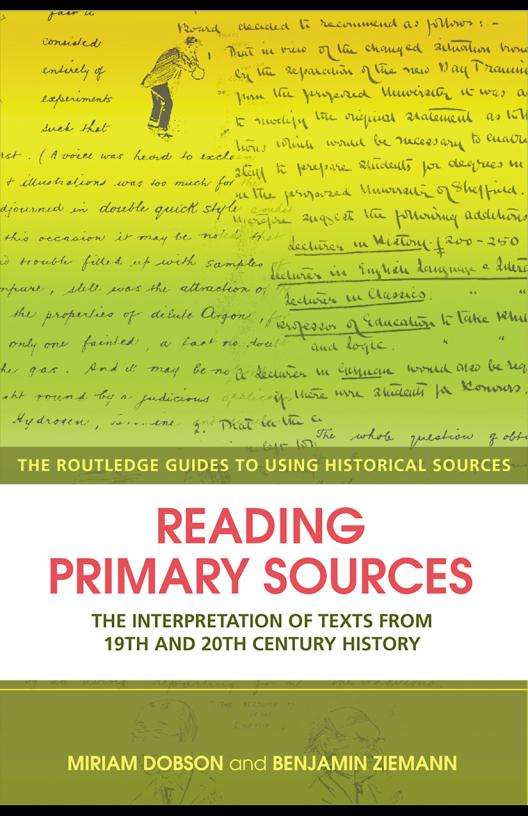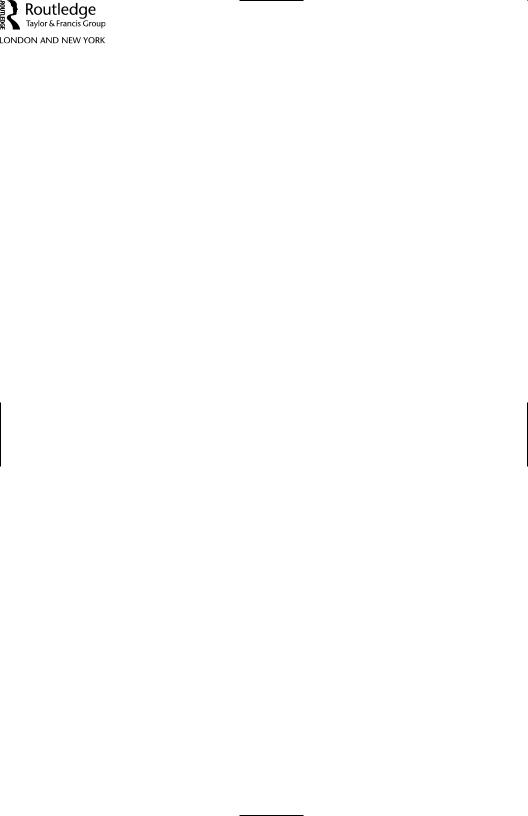
[Miriam_Dobson,_Benjamin_Ziemann]_Reading_Primary_(BookZZ.org)
.pdf

Reading Primary Sources
‘Reading Primary Sources is at once a bold and useful book . . . With felicity and insight, the authors of this volume show us how modern historians now read primary sources . . . A wonderful volume for teachers and students alike.’ – Helmut Walser Smith, Vanderbilt University, USA.
Primary sources are not only the very basis of historical research, but are also widely used in undergraduate teaching as a way to introduce students to voices from the past. The contributors to this book explore various traditions in sourcecriticism, explain the different ways documents can be read, and use exciting examples from their own research to suggest the insights (and also difficulties) texts might offer.
Taking into account the huge expansion in the range of primary sources used by historians, the volume includes chapters on opinion polls, surveillance reports, testimony and court files, in addition to more traditional genres such as letters, memoranda, diaries, novels, newspapers, political speeches and autobiography. To aid the reader’s understanding of source criticism, the chapters in the first part of this unique volume give an overview of both traditional and new methodological approaches to the use of primary documents. In addition, the introduction offers an accessible checklist suggesting some of the most important steps for interpreting historical sources.
Taking examples of sources from many European countries and the USA, and providing up-to-date information on the most widely used textual sources, this is the perfect companion for every student of history who wants to engage with primary sources.
Miriam Dobson is Lecturer in Modern History at the University of Sheffield. Her forthcoming monograph explores popular responses to the reforms of the Khrushchev era.
Benjamin Ziemann is Reader in Modern History at the University of Sheffield. His recent publications include: War Experiences in Rural Germany 1914–1923 (2007); (ed.), Peace Movements in Western Europe, Japan and the USA during the Cold War (2007).

Routledge guides to using historical sources
Routledge Guides to Using Historical Sources is a series of books designed to introduce students to different sources and illustrate how they are used by historians. Each volume explores one type of primary source from a broad spectrum and, using specific examples from around the globe, examines their historical context, and the different approaches that can be used to interpret these sources.
Reading Primary Sources
Miriam Dobson and Benjamin Ziemann
History Beyond the Text
Sarah Barber and Corinna Penniston-Bird (forthcoming)
Using Material Sources (forthcoming)

Reading Primary Sources
The interpretation of texts from nineteenthand twentieth-century history
Edited by Miriam Dobson and Benjamin Ziemann

First published 2009 by Routledge
2 Park Square, Milton Park, Abingdon, Oxon OX14 4RN
Simultaneously published in the USA and Canada by Routledge
270 Madison Ave, New York, NY 10016
Routledge is an imprint of the Taylor & Francis Group, an informa business
This edition published in the Taylor & Francis e-Library, 2008.
“To purchase your own copy of this or any of Taylor & Francis or Routledge’s collection of thousands of eBooks please go to www.eBookstore.tandf.co.uk.”
© 2009 Miriam Dobson and Benjamin Ziemann for selection and editorial matter; individual contributors for their contributions.
All rights reserved. No part of this book may be reprinted or reproduced or utilised in any form or by any electronic, mechanical, or other means, now known or hereafter invented, including photocopying and recording, or in any information storage or retrieval system, without permission in writing from the publishers.
British Library Cataloguing in Publication Data
A catalogue record for this book is available from the British Library
Library of Congress Cataloging in Publication Data
Reading primary sources: the interpretation of texts from 19th and 20th century history/edited by Miriam Dobson and Benjamin Ziemann.
p.cm — (Routledge guides to using historical sources)
1.History—Methodology. 2. History, Modern—
19th century–—Sources. 3. History, Modern—20th century–—Sources. I. Dobson, Miriam. II. Ziemann, Benjamin.
D16.R23 2008 909.8072—dc22
ISBN 10: 0–415–42956–0 (hbk)
ISBN 10: 0–415–42957–9 (pbk)
ISBN 10: 0–203–89221–6 (ebk)
ISBN13: 978–0–415–42956–6 (hbk)
ISBN13: 978–0–415–42957–3 (pbk)
ISBN13: 978–0–203–89221–3 (ebk)
ISBN 0-203-89221-6 Master e-book ISBN

Contents
|
Acknowledgments |
vii |
|
List of contributors |
viii |
|
List of abbreviations |
ix |
|
Introduction |
1 |
|
BENJAMIN ZIEMANN AND MIRIAM DOBSON |
|
PART I |
|
|
Reading primary sources: contexts and approaches |
19 |
|
1 |
Understanding history: hermeneutics and source-criticism |
|
|
in historical scholarship |
21 |
|
PHILIPP MÜLLER |
|
2 |
Reading texts after the linguistic turn: approaches from |
|
|
literary studies and their implications |
37 |
|
CHRISTOPH REINFANDT |
|
PART II |
|
|
Varieties of primary sources and their interpretation |
55 |
|
3 |
Letters |
57 |
|
MIRIAM DOBSON |
|
4 |
Surveillance reports |
74 |
|
MORITZ FÖLLMER |
|
5 |
Court files |
90 |
|
CLAUDIA VERHOEVEN |
|
6 |
Opinion polls |
106 |
ANJA KRUKE

vi |
Contents |
|
7 |
Memoranda |
123 |
|
KRISTINA SPOHR READMAN |
|
8 |
Diaries |
141 |
|
CHRISTA HÄMMERLE, translated by Andrew Evans |
|
9 |
Novels |
159 |
|
JULIA REID |
|
10 |
Autobiography |
175 |
|
DAVID CARLSON |
|
11 |
Newspapers |
192 |
|
STEPHEN VELLA |
|
12 |
Speeches |
209 |
|
PAUL READMAN |
|
13 |
Testimony |
226 |
|
DEVIN O. PENDAS |
|
|
Glossary |
243 |
|
Index |
246 |

Acknowledgments
The idea for this volume grew out of the experience of teaching source-based modules to history undergraduates at the University of Sheffield. We found no proper guidance on source interpretation reflecting recent theoretical developments, nor any up-to-date introduction to some of the most important source genres used in the writing of modern history. Our attempt to fill this void owes a lot to the help and encouragement of many people. First and foremost, the authors, an interdisciplinary team of younger scholars from the USA, the UK and the European continent, brought their expertise and their reflexivity to this venture. We are most grateful for their efforts and their readiness to share ideas on textual interpretation. Many other colleagues in England, across the Channel and the Atlantic offered help and advice, or commented on a draft version of our introduction. In particular, we would like to thank Henk de Berg, Caroline Bland, Rüdiger Graf, Caroline Hoefferle, Daniel Morat, Helmut Walser Smith, Martin Heale, Daniel Scroop and Matt Houlbrook. In addition, Benjamin Ziemann would like to thank Christoph Reinfandt and Christiane Eifert, Willibald Steinmetz and Thomas Welskopp, who invited him to discuss the topic of this volume in their research seminars in Tübingen and Bielefeld, and those who asked pertinent questions at these occasions. He would also like to thank Thomas Kühne and Thomas Mergel, friends and permanent interlocutors.
At Routledge, Eve Setch was enthusiastic about our project from the beginning. Her support has made this book possible, and her help during the early stages was invaluable. We would also like to thank the anonymous reviewers she solicited for their suggestions. Annamarie Kino, who took over from Eve as our editor, was equally cheerful and guided us safely into and through the production process. Thanks go also to Christine Brocks for her professional work in compiling the index. We gratefully acknowledge the permission to print excerpts from the diaries of Therese Lindenberg, published by the Böhlau Verlag in Vienna, and to print excerpts from the Meldungen aus dem Reich, granted by Heinz Boberach. The University of Sheffield kindly granted permission to use documents from the university archive as a cover illustration. Our thanks go to the University of Sheffield and to Anthea Stevenson in particular who helped select appropriate images.
Miriam Dobson and Benjamin Ziemann, Sheffield, February 2008

Contributors
David Carlson is Associate Professor of English Literature at the California State University, San Bernardino.
Miriam Dobson is Lecturer in Modern History at the University of Sheffield.
Moritz Föllmer is Senior Lecturer in Modern European History at the University of Leeds.
Christa Hämmerle is Professor of Modern History at the University of Vienna.
Anja Kruke is Research Associate at the Historical Research Centre of the Friedrich Ebert Foundation, Bonn.
Philipp Müller is Assistant Professor at the Department of History, Humboldt University, Berlin.
Devin O. Pendas is Associate Professor of History at Boston College.
Stephen Vella is Assistant Professor of British History at Wake Forest University, Winston-Salem, NC.
Paul Readman is Lecturer in Modern British History at King’s College London.
Julia Reid is Lecturer in Victorian Literature at the .
Christoph Reinfandt is Professor of Modern English Literature at the University of Tübingen.
Kristina Spohr Readman is Lecturer in International History at the London School of Economics and Political Science.
Claudia Verhoeven is Assistant Professor of Modern European History at George Mason University, Fairfax, VA.
Benjamin Ziemann is Reader in Modern History at the University of Sheffield.

Abbreviations
AHR |
American Historical Review |
CSH |
Cultural and Social History |
CWH |
Cold War History |
D&S |
Diplomacy and Statecraft |
DH |
Diplomatic History |
EHR |
English Historical Review |
H&T |
History and Theory |
HJ |
Historical Journal |
HRes |
Historical Research |
HWJ |
History Workshop Journal |
JCWS |
Journal of Cold War Studies |
P&P |
Past and Present |
